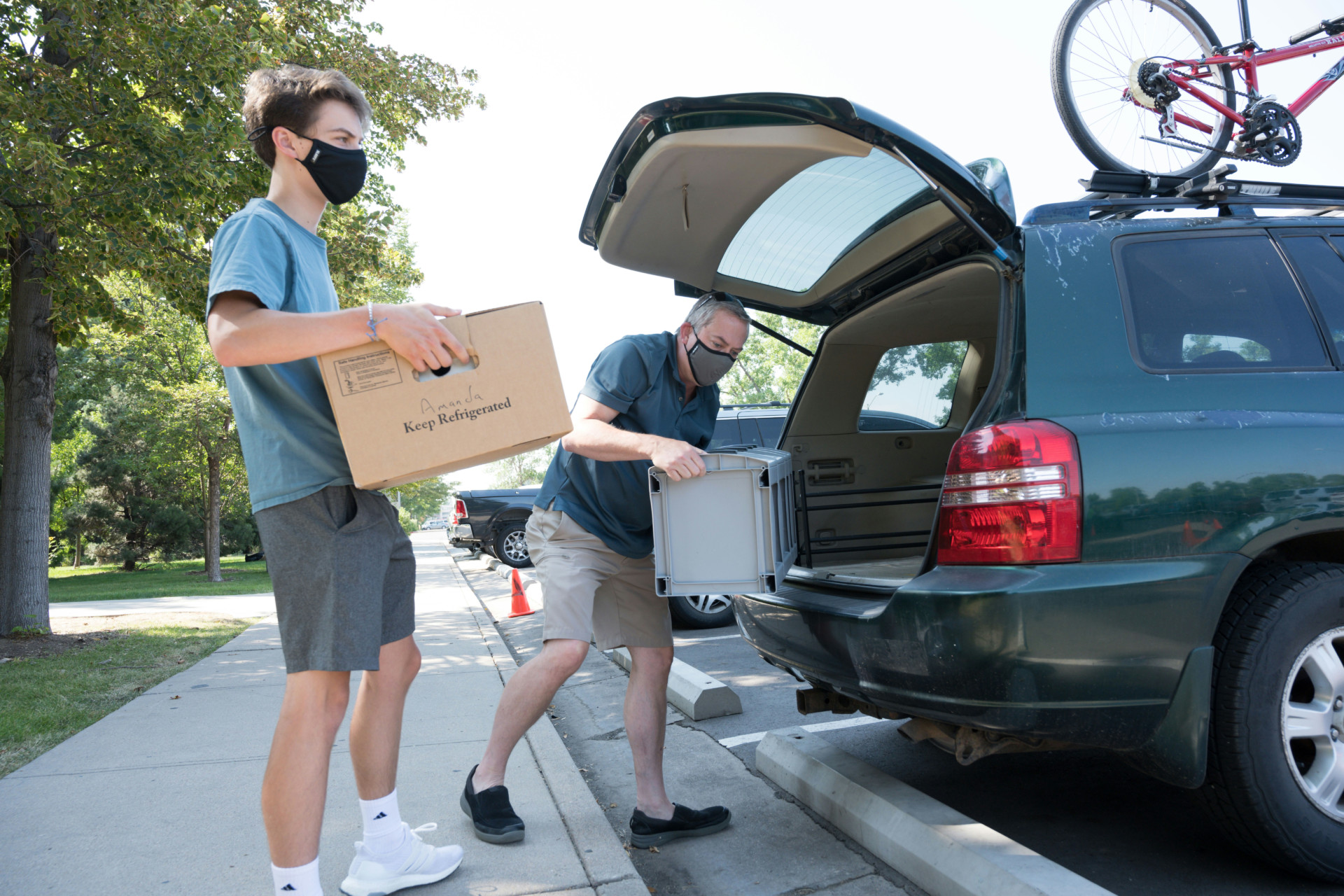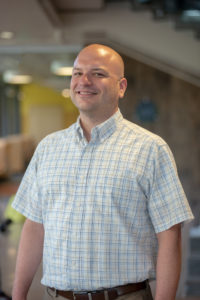
Austin Dodge (left) with his father, Jeff, during move-in week in Sept. 2020. Jeff is a member of CSU’s news team. Photo: John Eisele/ CSU Photography
Austin Dodge has a story that he can tell his grandchildren one day: He was quarantined in a Colorado State University residence hall during the coronavirus pandemic in 2020.
A first-year student studying psychology, Dodge learned in mid-September that he had been in contact with someone on campus who had tested positive for COVID-19. At first, he didn’t really know what that meant for him, though he knew he would need to limit his contact with other people.
He was moved pretty quickly from his room in Westfall Hall into Corbett Hall for what became a two-week quarantine. The process was smooth, he said. Dodge packed some essentials and was driven by van to his new but temporary digs that were in a section of the building isolated from other residents.
When he arrived, there was a packet of information that Dodge said answered pretty much every question he could think of. While in quarantine, he received a box of meals and snacks each morning so he did not need to go to the dining center. He attended classes online for those two weeks.
“The quarantine hotline was the most useful thing for me,” he said. The line is staffed 24 hours a day, and Dodge said he was grateful for the help he received.
University expertise shaped quarantine plans

Nick Sweeton, associate executive director of Housing & Dining Services at CSU, was one of the main architects of a plan to coordinate COVID-19 testing of students who live in University housing. He also helped establish guidelines for quarantine and isolation space, and a new meal delivery service.
CSU experts were instrumental in creating the plans to keep students safer during the pandemic, he said. By April, a core group was already at work on how things would change on campus during the fall semester. This team spent the entire summer consulting with others and creating a plan for on-campus housing and dining.
In addition, robust screening and testing, including wastewater surveillance and contact tracing on campus, has helped Housing & Dining Services better manage things during the pandemic.
“Our university experts informed our strategies,” he said. This includes leadership and staff at the CSU Health Network, public health experts, and researchers, among others.
Sweeton said the team examined advice and guidelines from professional associations and met with administrators from other public colleges and universities in Colorado.
More than 1,700 people who work in Housing & Dining Services, including live-in professional and graduate student staff, resident assistants, facilities and dining staff.
“My counterpart, Associate Executive Director Laura Giles, had a vision for how our huge organization in Housing & Dining Services could divide and conquer,” he said.
Giles created several cross-sectional workgroups, each one charged with examining the operational impact of the pandemic on every corner of Housing & Dining Services. A core group focused specifically on quarantine and isolation plans.
No end in sight to changes in routine during the pandemic
Sweeton said working in higher education for more than 20 years helped prepare him for this moment.
“When the pandemic started, the first things I thought about were: Who do I need to have a good relationship with, and how do I leverage the bureaucracy to do what needs to be done?”
“In a pandemic, the stakes are higher and there’s no end in sight to the changes we’ve implemented,” Sweeton said. “There are always new things to think about and grapple with. But the approach I’ve taken is similar to other problems I’ve dealt with over the course of my career.”
Sweeton said major kudos should go to Housing & Dining Services staff.
“Nothing shows us who we are like a crisis does, and I’m so proud of staff, for the way they take care of each other, and take care of our students,” he said. “They’re a big part of what motivates me to get up every day and do this work in a difficult context.”
Students take health protocols seriously
He also applauded students like Dodge who have played a big role in ensuring classes continue on campus, while other universities have had to revert to online instruction.
“They are taking this seriously and getting tested when we ask them to get tested,” Sweeton said. “We are doing so much better than other universities on compliance with wearing masks, and we are not having the same problems with large gatherings that other places are having. Our students get it, they’re taking it seriously, and they’re doing what we need to do in order to remain open and to get them as close to a traditional experience during a global pandemic.”
Jenn Reiskamp, community liaison specialist with Off-Campus Life at CSU and Neighborhood Services at the City of Fort Collins, agreed with Sweeton that CSU students should be commended. In her dual roles, she works to ensure students living off-campus are good neighbors and are aware of city codes and ordinances.
“The majority of our students are following expectations,” said Reiskamp. “This has been the quietest party season in the last few years.”
Prior to the pandemic, Reiskamp said it was typical to see parties with 300 to 500 people during the first few weeks of school. “We haven’t seen those numbers,” she said.
And with fall break less than a week away, Reiskamp said she is hopeful CSU students will remain vigilant.
A story for the history books
As for Dodge, he tested negative for COVID-19 and moved back to Westfall Hall following the quarantine. He said he appreciates things in life a lot more, like being able to go where he wants, talk to people – and have more of a say in what he eats.
He learned to meditate – which he said was really useful for his mental health – but said he’s not really doing that any more.
“My mom said this experience will be something to tell my grandkids when I’m old,” he said. “Back in the day… I got quarantined. I wouldn’t say it was a fun experience, but it was really interesting to go through the process. The pandemic got real for me, then. It got really personal for me.”